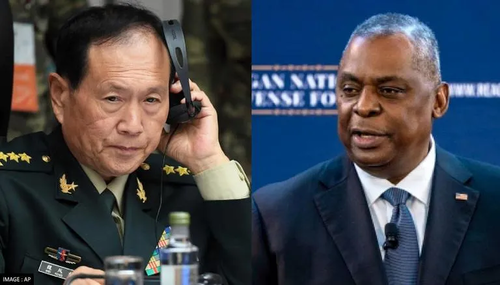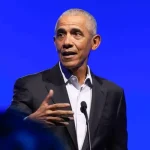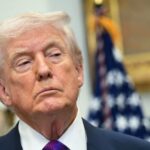
China has once again firmly denied providing military assistance to Russia at any point in its invasion to Ukraine, a Chinese military spokesman said after bilateral talks with the United States military. US Defense Secretary Lloyd Austin and Chinese Minister of National Defense Gen. Wei Fenghe met Friday in Singapore, in what marked their first face-to-face summit. The two had previously discussed the Russia-Ukraine war via phone.
The meeting was held on the sidelines of the Shangri-la Dialogue, a major regional defense summit. Austin's meeting with his Chinese counterpart lasted nearly an hour, though it was only scheduled for thirty minutes. A Pentagon readout of the meeting said that Austin informed Wei that the US "remains committed to our longstanding one China policy" regarding the status of Taiwan. This after Biden in a May press conference said the US is committed to defending Taiwan militarily - comments later walked back by the White House.
The Friday statement by Austin said the US "remains committed to our longstanding one China policy, which is guided by the Taiwan Relations Act, the Three U.S.-China Joint Communiques, and the Six Assurances."
But in this context, the US Defense Secretary warned Beijing in the meeting to "refrain from further destabilizing actions" on Taiwan. "The Secretary reaffirmed the importance of peace and stability across the Strait, opposition to unilateral changes to the status quo, and called on the PRC to refrain from further destabilizing actions toward Taiwan," according to the readout.
The two defense chiefs also pledged to improve military-to-military communications, especially in avoidance of triggering an inadvertent or 'accidental' crisis, such as recently occurred between Australian and Chinese aircraft in the Pacific region.
"Secretary Austin discussed the need to responsibly manage competition and maintain open lines of communication. The Secretary underscored the importance of the People’s Liberation Army engaging in substantive dialogue on improving communications during crises and reducing strategic risk," the US side said.
As for the Chinese side, a spokesman described the Lloyd Austin meeting as "candid" but "positive and constructive" - saying further that "it is better to meet than not to meet and it is better to talk than not to talk," according to the words Senior Colonel Wu Qian to reporters.
US is inviting Taiwanese officials to DC for formal #trade talks. This is about as close to formal recognition as one can get without having a parade.#Taiwanhttps://t.co/h14zkeBzlH
— Peter Zeihan (@PeterZeihan) June 1, 2022
The day prior, on Thursday, China's Defense Ministry issued a strongly-worded statement vowing to take "powerful measures" to "defeat any forms of foreign interference" in Taiwan and particularly attempts to bolster "Taiwan independence" plots.
The statement was in response to reports that the State Department is mulling a fresh $120 million arms sale to the island. Beijing said it "strongly opposes" the plan for more US arms transfers.
China has once again firmly denied providing military assistance to Russia at any point in its invasion to Ukraine, a Chinese military spokesman said after bilateral talks with the United States military. US Defense Secretary Lloyd Austin and Chinese Minister of National Defense Gen. Wei Fenghe met Friday in Singapore, in what marked their first face-to-face summit. The two had previously discussed the Russia-Ukraine war via phone.
The meeting was held on the sidelines of the Shangri-la Dialogue, a major regional defense summit. Austin’s meeting with his Chinese counterpart lasted nearly an hour, though it was only scheduled for thirty minutes. A Pentagon readout of the meeting said that Austin informed Wei that the US “remains committed to our longstanding one China policy” regarding the status of Taiwan. This after Biden in a May press conference said the US is committed to defending Taiwan militarily – comments later walked back by the White House.
The Friday statement by Austin said the US “remains committed to our longstanding one China policy, which is guided by the Taiwan Relations Act, the Three U.S.-China Joint Communiques, and the Six Assurances.”
But in this context, the US Defense Secretary warned Beijing in the meeting to “refrain from further destabilizing actions” on Taiwan. “The Secretary reaffirmed the importance of peace and stability across the Strait, opposition to unilateral changes to the status quo, and called on the PRC to refrain from further destabilizing actions toward Taiwan,” according to the readout.
The two defense chiefs also pledged to improve military-to-military communications, especially in avoidance of triggering an inadvertent or ‘accidental’ crisis, such as recently occurred between Australian and Chinese aircraft in the Pacific region.
“Secretary Austin discussed the need to responsibly manage competition and maintain open lines of communication. The Secretary underscored the importance of the People’s Liberation Army engaging in substantive dialogue on improving communications during crises and reducing strategic risk,” the US side said.
As for the Chinese side, a spokesman described the Lloyd Austin meeting as “candid” but “positive and constructive” – saying further that “it is better to meet than not to meet and it is better to talk than not to talk,” according to the words Senior Colonel Wu Qian to reporters.
US is inviting Taiwanese officials to DC for formal #trade talks. This is about as close to formal recognition as one can get without having a parade.#Taiwanhttps://t.co/h14zkeBzlH
— Peter Zeihan (@PeterZeihan) June 1, 2022
The day prior, on Thursday, China’s Defense Ministry issued a strongly-worded statement vowing to take “powerful measures” to “defeat any forms of foreign interference” in Taiwan and particularly attempts to bolster “Taiwan independence” plots.
The statement was in response to reports that the State Department is mulling a fresh $120 million arms sale to the island. Beijing said it “strongly opposes” the plan for more US arms transfers.







